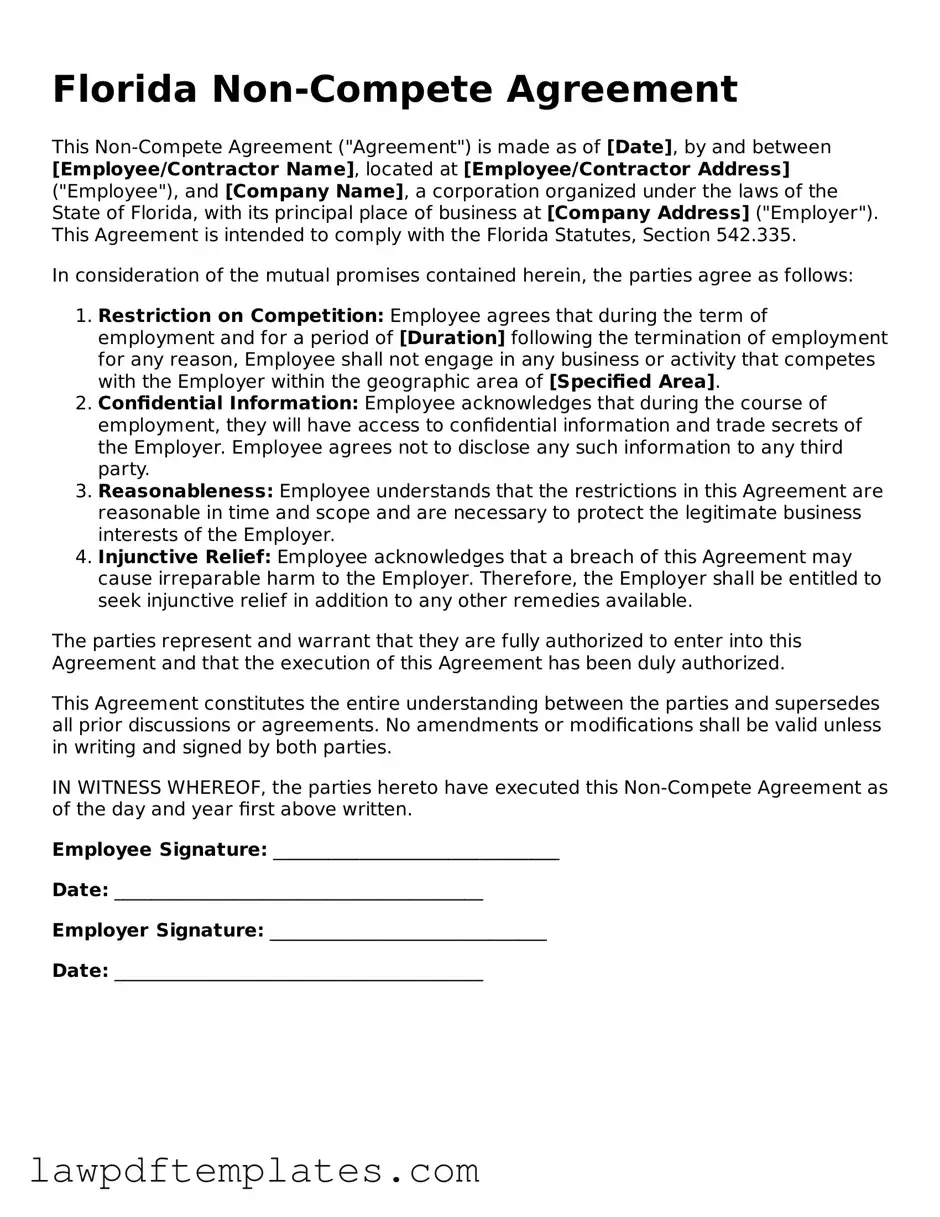Free Non-compete Agreement Template for the State of Florida
Form Breakdown
| Fact Name | Description |
|---|---|
| Definition | A non-compete agreement is a contract that restricts an employee from working with competitors or starting a competing business for a specified period after leaving a job. |
| Governing Law | Florida Statutes, Chapter 542.335 governs non-compete agreements in Florida. |
| Enforceability | To be enforceable, a non-compete agreement must be reasonable in time, geographic area, and scope of activity. |
| Duration | Typically, non-compete agreements in Florida are limited to a duration of up to two years, but exceptions may apply. |
| Geographic Scope | The geographic area covered by the agreement must be clearly defined and reasonable in relation to the business interests at stake. |
| Consideration | For a non-compete agreement to be valid, there must be consideration, such as employment or access to trade secrets. |
| Legal Challenges | Employees can challenge non-compete agreements in court, arguing they are overly restrictive or not supported by legitimate business interests. |
| Potential Penalties | Violating a non-compete agreement can result in legal action, including injunctions and monetary damages. |
Sample - Florida Non-compete Agreement Form
Florida Non-Compete Agreement
This Non-Compete Agreement ("Agreement") is made as of [Date], by and between [Employee/Contractor Name], located at [Employee/Contractor Address] ("Employee"), and [Company Name], a corporation organized under the laws of the State of Florida, with its principal place of business at [Company Address] ("Employer"). This Agreement is intended to comply with the Florida Statutes, Section 542.335.
In consideration of the mutual promises contained herein, the parties agree as follows:
- Restriction on Competition: Employee agrees that during the term of employment and for a period of [Duration] following the termination of employment for any reason, Employee shall not engage in any business or activity that competes with the Employer within the geographic area of [Specified Area].
- Confidential Information: Employee acknowledges that during the course of employment, they will have access to confidential information and trade secrets of the Employer. Employee agrees not to disclose any such information to any third party.
- Reasonableness: Employee understands that the restrictions in this Agreement are reasonable in time and scope and are necessary to protect the legitimate business interests of the Employer.
- Injunctive Relief: Employee acknowledges that a breach of this Agreement may cause irreparable harm to the Employer. Therefore, the Employer shall be entitled to seek injunctive relief in addition to any other remedies available.
The parties represent and warrant that they are fully authorized to enter into this Agreement and that the execution of this Agreement has been duly authorized.
This Agreement constitutes the entire understanding between the parties and supersedes all prior discussions or agreements. No amendments or modifications shall be valid unless in writing and signed by both parties.
IN WITNESS WHEREOF, the parties hereto have executed this Non-Compete Agreement as of the day and year first above written.
Employee Signature: _______________________________
Date: ________________________________________
Employer Signature: ______________________________
Date: ________________________________________
Common mistakes
Filling out the Florida Non-compete Agreement form can be a straightforward process, but several common mistakes can lead to complications. One significant error is failing to specify the geographic area covered by the non-compete clause. Without a clear definition of the territory, the agreement may be deemed overly broad and unenforceable.
Another frequent mistake involves not clearly defining the scope of prohibited activities. Parties may leave this section vague, which can create confusion about what actions are restricted. A well-defined scope helps both parties understand their rights and obligations, reducing the risk of disputes in the future.
Many individuals overlook the duration of the non-compete agreement. It is essential to set a reasonable time frame for the restrictions to be in effect. A duration that is too long may be challenged in court, while a duration that is too short may not adequately protect the interests of the party seeking the agreement.
Failure to consider the consideration provided in exchange for the non-compete agreement is another common mistake. In Florida, there must be a legitimate business interest that justifies the restrictions. If this interest is not adequately articulated, the agreement may lack enforceability.
People often neglect to include a severability clause in the agreement. This clause ensures that if one part of the agreement is found to be unenforceable, the rest remains valid. Without this provision, the entire agreement could be at risk if a court invalidates a single section.
Lastly, individuals may forget to have the agreement reviewed by legal counsel. A legal professional can identify potential issues and ensure that the agreement complies with Florida law. Skipping this step can lead to significant problems down the line, including costly litigation.
Discover More Non-compete Agreement Templates for Specific States
How to Get Out of a Non Compete Agreement - Employees must understand how long the restrictions will last after they leave their job.
For those seeking more information about completing the USCIS I-864 form, resources such as PDF Documents Hub can provide valuable guidance to ensure all requirements are met effectively.
Are Non Competes Enforceable in California - These contracts typically outline geographic areas where the employee is prohibited from working with competitors.
Atlanta Non-compete Lawyer - This form protects against unfair competition that harms the employer's business strategies.
